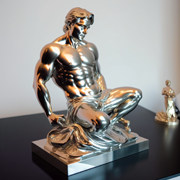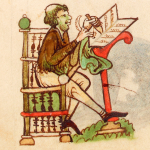|
Grand Fromage posted:Those raised bricks in the road were partly so you could walk across them without stepping in poo poo. In medieval towns, shoes with ridiculous heels/platforms were common to keep your feet out of the poo poo. Roman ones had much better sanitation but major roads could still get pretty gross. Was this because of horses and other animals, or were there just that many people making GBS threads in the street/dumping pots of poo poo into the street?
|
|
|
|

|
| # ? May 25, 2024 18:54 |
|
Both. They had the public latrines and sewers and all, but chamber pots and whatnot would just get disposed of wherever. And I don't know if Pompeii had extensive sewers, I assume it did because it was a fairly major city but couldn't tell you. Animal carts going down the street were a big street poo poo source, though.
|
|
|
|
Did Romans use human excrement as fertilizer ala night soil? I know they used urine for laundry.
|
|
|
|
I don't know if anyone knows but I would assume so.
|
|
|
|
Did Romans have 'brands' like we do today or was it just like "buy your poo poo from your ol' pal Theseus" or whatever. I guess what I'm asking is, did they have corporations or something like we do or did that really only ACTUALLY develop in the world as LLCs in Medieval/Renaissance Europe.
|
|
|
|
Both. There are plenty of people today that don't really care and will take a squat and lay a brick on a subway platform or something. I mean the Romans probably didn't make it a habit because they had bathrooms. Animals, however were definitely making GBS threads everywhere all the time. There's no transportation system besides animals, and nobody is road-training their ox, so roads were pretty rank with animal poop. It wasn't even long ago that NYC had severe horseshit pollution issues because of how much stuff was being dragged around by thousands of horses in tiny Manhattan. Horseshit isn't so bad, as poop goes, but the sort of build-up New Yorkers were getting was kinda toxic and bred all sorts of disease. Any pre-automobile municipality had the same issue to deal with, just some towns also had people poo poo mixed in.
|
|
|
|
WHAT A GOOD DOG posted:Did Romans have 'brands' like we do today or was it just like "buy your poo poo from your ol' pal Theseus" or whatever.
|
|
|
|
Halloween Jack posted:Roman law recognized a wide range of corporations (in the original sense, including not just businesses but churches, clubs, charities, etc.) as collegia. True Roman bread, for true Romans. For anyone not getting the reference: https://www.youtube.com/watch?v=nIMGmbbx37A&t=89s
|
|
|
|
That was Baron Harkonnen's problem all along: carbs.
|
|
|
|
karl fungus posted:Do we have contemporary Byzantine writings from between the fall of the west up to the early spread of Islam? I'm very curious as to what the Byzantines thought of what was going on around them at the time, and how they viewed the loss of the western empire, or perhaps the new Islamic expansion providing a potent threat. There are plenty of contemporary histories/chronicles/saints' lives or even just random documents surviving from this period. Some more so than others - the period around Leo I and Zeno (when the Western Empire fell) is pretty scarce, but once we hit the sixth century there are a lot more sources. The most famous is Procopius, who wrote about Justinian's reign. He and his continuators wrote narrative histories up to the reign of Emperor Maurice (overthrown in 602), so we know quite a bit about the sixth century. My impression of them is that they were still pretty much pre-occupied with their own problems, not worrying so much about the fall of the West or the weak Arab tribes in Arabia. Which makes sense, as most of Italy was under Byzantine control from 540-ish onwards and most Germanic kings tend to acknowledge nominal Byzantine supremacy anyway (We have records from the Franks and the Visigoths talking about how they tried to gain the traditional Roman offices, such as magister militum per INSERT REGION HERE, from the emperor). The Arabs meanwhile were generally allies or clients of either the Byzantines or the Persians and used as auxillaries in their wars, so again, not very special in Byzantine eyes. If they worried about anything, they were worried about the threat from Persia (from 627 onwards they were only at peace for 28 years for the next century) and the various theological debates. The same is in the seventh century, except we now have fewer sources. There are some contemporary stuff, like the Paschale Chronicle written in the 630s, but they don't provide as much detail. But given what we know, the Byzantines were still focusing on the east - the war between them and Persia from 602-628 is quite correctly termed the "last great war of antiquity", in that time the Byzantines lost all their eastern provinces and it was only due to the exceptionally ballsy Emperor Heraclius that they won in the end. Of course... 4 years later Muhammad died and the Arabic conquests began, attacking the still weakly defended provinces and two bankrupt empires. There are only a few contemporary references to these invasions. The first that comes to mind is an anti-Jewish propaganda pamphlet from Africa written in 634 - basically, a Jewish convert to Christianity talks about how the Christian empire will survive the threat from the false prophet in the desert and that Jews should still abandon their faith despite recent Byzantine defeats. The second is a speech by the Patriarch of Jerusalem about how these barbarians are overrunning Byzantine territories. Neither are very detailed sources, but they do tell us that at this early stage the Arabs were still just another group of barbarians attacking the empire (Arab raids and even involvement in Byzantine politics were common since the fifth century, so I don't think it was a dramatic shift in Byzantine perception of them), although they also recognise the religious aspect of this new threat. I hope this helps! I'm happy to answer more questions if you have any.
|
|
|
|
karl fungus posted:Do we have contemporary Byzantine writings from between the fall of the west up to the early spread of Islam? I'm very curious as to what the Byzantines thought of what was going on around them at the time, and how they viewed the loss of the western empire, or perhaps the new Islamic expansion providing a potent threat. Well, one of the more famous responses to the shitkicking recieved from the Islamic expansion were the Iconoclasts. Basically, one of the beefs the Muslims had with Christianity was what they saw as a decline into polytheism (e.g. the Trinity) and idolatry (saint worshipping and icons of the saints) at some point the thinking ran 'if they're beating the poo poo out of us, maybe they're right, let's worship less icons and maybe God'll come back around to our side.'
|
|
|
|
Grand Fromage posted:His reputation is definitely exaggerated because he's Caesar, but all evidence is he was a brilliant general. I mean, ignore all the writing and just look at what happened. Gaul had resisted Rome for ages and Caesar rolls up the entire place in a decade. He knew what he was doing. But Hannibal would've walked all up and down his rear end without breaking a sweat. I used to think this way about Caesar too, until I realized the reason Caesar is famous isn't for subjugating Gaul; it's for fighting against Romans--outnumbered, at that-- and winning decisively.
|
|
|
|
Grand Fromage posted:Both. They had the public latrines and sewers and all, but chamber pots and whatnot would just get disposed of wherever. And I don't know if Pompeii had extensive sewers, I assume it did because it was a fairly major city but couldn't tell you. Hell, look at a modern city that has a mounted police force. If the mounted force has gone through recently you will probably find big lumps of horse poo poo in the middle of the road. Now imagine that animals are the primary means of transportation (besides walking).
|
|
|
|
Phobophilia posted:
|
|
|
|
Not My Leg posted:Hell, look at a modern city that has a mounted police force. If the mounted force has gone through recently you will probably find big lumps of horse poo poo in the middle of the road. Now imagine that animals are the primary means of transportation (besides walking). I recently heard how much dogpoop gets dropped here every day. It's a few tons. And those are small animals. Imagine horses and ox carts everywhere. Most likely they organised some slaves to cart all the dung out of the city, lest you'd be accessing your house from the roof soon.
|
|
|
|
Wow, it must have been like thick, dark brown snow blanketing everything.
|
|
|
|
InspectorBloor posted:Most likely they organised some slaves to cart all the dung out of the city, lest you'd be accessing your house from the roof soon. Maybe horse fertilizer was a precious market item that street gangs clashed over.
|
|
|
|
not as good as elephant dung though. Apparently that was prized by the market gardeners around Rome.
|
|
|
|
Mitthrawnuruodo posted:Right, so there's nothing systematic about it. I just noticed a few trends - like it's common to drop the '-us' suffix (Octavianus = Octavian, Diocletianus = Diocletian), or to Anglicise most I's that are followed by a vowel into a J (Iulius = Julius, Iuppiter = Jupiter), and thought there might be some translation rulebook somewhere that provides a basis for all this. Cheers folks! Catching up on this amazing thread but wanted to reply to this 4-month old post! I'm not sure about English, but the shift from Latin to Castilian (Spanish) is actually well-studied and pretty predictable. I imagine it's something similar throughout other Romance tongues. For instance, Basque had a large influence on early Castilian due to the entire Moorish conquest business. "f" didn't exist in Basque, so lots of words begin dropping the sound completely, e.g. "facere" becoming "hacer", both meaning "to make". That "-e" at the end of Latin infinitives is also dropped. Other examples not necessarily related to Basque include Latin's "-ct-" becoming "-ch-" (noctem > noche; octo > ocho), stressed "-e-" and "-o-" becoming "-ie-" and "-ue-" (ventus > viento; porta > puerta) Why Spanish lost Latin's "-us" (murus > muro) and the like was simply because everyone gradually began using the same case ending for everything. Apparently case endings were too much of a bother in the everyday lives of Vulgar Latin speakers: http://en.wikipedia.org/wiki/Vulgar_Latin#Loss_of_cases So in the case of Castilian, it was a case of some people in a semi-localized region in the mountainous Northern Spain speaking funny and interpreting vowels, consonants, and also more broadly grammatical structure a bit differently than the rest of the formerly Roman world, and the language diffusing from there. I guess if you want, you could draw the parallel of what-if the global order collapsed tomorrow and in 2,000 years the language of the Appalachians backwoodsmen came to dominate the globe. Manuscripts from the turn of the first millennium are particularly interesting to see as sort of a bridge between Latin and Castillian. You were right in assuming there are certain 'rules' or 'trends'. If you already speak a Romance language or are interested in learning one, these trends are also handy and worth learning as they nominally help your comprehension in related Romance tongues as you begin to understand how each diverged. This Wikipedia article does a great job giving a summary of how this sort of language evolution happens: http://en.wikipedia.org/wiki/History_of_Spanish For extra fun, you could get into Mozarabic which is the divergence of Vulgar Latin under the influence of the Arabic-speaking Moors, contemporary with early Castilian: http://en.wikipedia.org/wiki/Mozarabic_language For even more fun, they were rocking Galaico-Portuguese in north-western Hispania around the same time: https://www.youtube.com/watch?v=-KEi_bvtbuM This also illustrates just how fractured the spoken word of post-Roman Western Europe was, in addition to whatever political and economic happenings there were.
|
|
|
|
I've been listening to the History of Rome podcast (thanks to those who recommended it, it's great) and I just got through Claudius' time in charge... holy crap what the hell was Messalina thinking? Sleeping around is one thing, but getting married to another man WHILE married to the Emperor? And not only NOT doing it in secret but making it a big lavish party with plenty of guests? How in the hell did they think they would get away with it? It is really interesting to see how "obvious" things got post-Augustus, which I suspect may have a fair bit to do not only with Augustus completely neutering the senate (Tiberius apparently desperately tried to get them to take a more active interest in running things and they didn't grab at what their predecessors had clung onto so desperately), but with all the purges and counter-purges wiping out the best and brightest of the empire. I mean hell, Claudius apparently only survived as long as he did because everybody was convinced he was an idiot (an idiot with a well respected academic writing career!) and even when it came out he wasn't, his highest points of his reign were essentially,"Dude did pretty good, I guess!". It seems to me that most of the people with drive, ambition and intelligence during the Tiberius/Caligula/Claudius and Nero years were people who couldn't actually raise to the highest position because of their family/gender - Agrippina, Sejanus, Narcissus etc all seemed to have the drive and the intelligence, but lacked either the pedigree or quite literally the balls to be Emperor. I read about a lot of half-baked plots by some members of the higher ranks, but they seemed to be pretty poorly planned/executed, ala Messalina's idea to marry another man, kill Claudius and then something something her new husband somehow becomes Emperor. Am I being unfair? Were their examples of intelligent, driven men in the Senate during this period? It seems like the freedmen bureaucrats were the ones with real drive/ambition, and the Senators were content to just enjoy their station in life and leave them (and ostensibly the Emperor) to run things. It was a slightly lower-born General in Vespasian who ended up taking a firm hand running the empire after the Nero/Post-Nero crisis, after all. Jerusalem fucked around with this message at 01:35 on Jun 8, 2013 |
|
|
|
Jerusalem posted:I've been listening to the History of Rome podcast (thanks to those who recommended it, it's great) and I just got through Claudius' time in charge... holy crap what the hell was Messalina thinking? Sleeping around is one thing, but getting married to another man WHILE married to the Emperor? And not only NOT doing it in secret but making it a big lavish party with plenty of guests? How in the hell did they think they would get away with it? You should watch I, Claudius. Sure it's fictional but it's not like we can know her true motivations and I felt pretty sorry for her in that. Her death scene is also great: https://www.youtube.com/watch?v=S9PSmuKpAQY
|
|
|
|
I really need to correct my poor life decisions and get around to watching I, Claudius.
|
|
|
|
Koramei posted:You should watch I, Claudius. Sure it's fictional but it's not like we can know her true motivations and I felt pretty sorry for her in that. Also, read I, Claudius. PittTheElder fucked around with this message at 03:58 on Jun 8, 2013 |
|
|
|
Jerusalem posted:Am I being unfair? Were their examples of intelligent, driven men in the Senate during this period? It seems like the freedmen bureaucrats were the ones with real drive/ambition, and the Senators were content to just enjoy their station in life and leave them (and ostensibly the Emperor) to run things. It was a slightly lower-born General in Vespasian who ended up taking a firm hand running the empire after the Nero/Post-Nero crisis, after all. You may be getting a slightly biased picture around Claudius' time because he was particularly known among the emperors for his use of freedmen. I also suppose that there's the problem of intelligent Senators noticing that there had been a remarkably successful transition to Empire, and that going against the imperial mechanisms of state would be insanely difficult. Not to mention the proscriptions of the Triumvirate and the maiestas trials of Tiberius being fresh in many people's minds. So you get the situation where all the senators actively plotting to take down an Emperor are probably kind of dumb and are going to get caught.
|
|
|
|
karl fungus posted:While we're on the subject of Antioch, what was notable about it? It's a name I've heard often, but I'm unsure of which events it took part in. From what little I know, it was a (relatively) major city in the Levant that was established in the Classical period, and became important enough in the development of Christianity that it was one of the Pentarchy cities. It was a major focal point of the Byzantine-Caliphate wars and later the Crusades, but then kind of dwindled into obscurity afterwards, probably due to how the city was repeatedly sacked and then soon after the Mongols hosed up the greater Middle East. It lasted a loooooong time though.
|
|
|
|
I don't know that much about Antioch really. It was a major major huge city of the east, and is vital to early Christianity... which I also don't know a lot about so, whoops. If anyone knows more stuff I'd be interested too.
|
|
|
|
Spiderfist Island posted:From what little I know, it was a (relatively) major city in the Levant that was established in the Classical period, and became important enough in the development of Christianity that it was one of the Pentarchy cities. It was a major focal point of the Byzantine-Caliphate wars and later the Crusades, but then kind of dwindled into obscurity afterwards, probably due to how the city was repeatedly sacked and then soon after the Mongols hosed up the greater Middle East. It lasted a loooooong time though. Antioch was the capital of the Alexandrian Seleucids, so it had status to the Romans as a symbol of their ascendance in the East. They built it up (repeatedly, as the location was prone to bad earthquakes) in the first few centuries AD and was effectively their eastern capital prior to the establishment of Constantinople. It suffered yet another devastating earthquake in the 6th century, and the Romans focused most of their efforts on Constantinople from then on so Antioch went into decline. As you stated, it was symbolically important for later religious wars, but it did not have much commercial or military value. Being one of the major cities in the eastern Mediterranean at the time, it was an important Christian center, as well. There is still an Antiochan Orthodox Church, directly descended from its early days as a major metropolitan center. Deteriorata fucked around with this message at 16:03 on Jun 8, 2013 |
|
|
|
Deteriorata is right; Antioch never really recovered from the sixth century earthquake. In its heyday, it was one of the five largest and most important cities in the Roman Empire--the eastern Mediterranean commercial gateway to points further east. Many of the goods coming up the Euphrates found their way through Antioch by way of overland routes from Palmyra or Dura Europos. Due to its commercial wealth, Antioch and its suburbs Seleucia Pieria and Daphne were lavishly decorated. Today, the city is famous for its quality of mosaics, many of which were excavated by Princeton in the 1930s. You can find many of them in U.S. museums, from Denver to Richmond. In the 30s, the focus was on the recovery of art for museums, so there's much left to learn of the city and society. When they excavated Daphne, they didn't even try to locate city block corners to develop a plan. New excavations are beginning very soon to fill in the enormous gaps in our knowledge of the city.
|
|
|
|
Thanks to the topography of the area, control of Antioch is of supreme importance to anyone wanting to march an army through Anatolia and into the Levant, or vice versa.  The Byzantines put a lot of effort into trying to maintain control over it for that very reason. Other things I know about Antioch: - During the seventh-century war between Byzantium and the Sassanids, Antioch isn't just sacked - a large number of its inhabitants are removed and resettled throughout Persia. - Valens favoured it over Consantinople as an eastern capital.
|
|
|
|
You know, something else just hit me when I saw that map. Constantinople, the major (usually sole) center of focus of every single Byzantine history book ever, is just in the northwest corner of that whole country. What was going on in the rest of it?
|
|
|
|
The Byzantine Empire was larger than what is now Turkey. Istanbul is an excellent capital because it had impervious walls and controlled the Black Sea (which also meant access into Eurasia through the rivers)
|
|
|
|
karl fungus posted:You know, something else just hit me when I saw that map. Constantinople, the major (usually sole) center of focus of every single Byzantine history book ever, is just in the northwest corner of that whole country. What was going on in the rest of it? The Byzantine Empire was much more then just modern day Turkey, especially at the start.
|
|
|
|
karl fungus posted:You know, something else just hit me when I saw that map. Constantinople, the major (usually sole) center of focus of every single Byzantine history book ever, is just in the northwest corner of that whole country. What was going on in the rest of it? In addition to what others have said, look how mountainous the interior of Turkey is - there's a reason the other major Greek/Roman/Byzantine cities in Turkey were concentrated on the coasts.
|
|
|
|
Install Gentoo posted:The Byzantine Empire was much more then just modern day Turkey, especially at the start. Oh, I knew that. I was just wondering why we don't hear so much about the other parts of the empire. Was Constantinople really the only major cultural center? There's Antioch, as was previously mentioned in the thread, but I don't see it that often in history books. To me, it's basically like defining the entire history of the United States through the eyes of New York City. karl fungus fucked around with this message at 23:36 on Jun 8, 2013 |
|
|
|
Thessaloniki was also very important. And at various times, Rome, Syracuse, Ravenna, Carthage, Alexandria, Jerusalem.
|
|
|
|
According to the History of Byzantium podcast, after the Persian king Khosrau The Second's general sacked Antioch, he brought a bunch of artisans from the city back to Persia, where they were made to inhabit a newly created city that Khosrau had named to something something meaning 'better than Antioch' in Persian. A quick Google search didn't turn up anything corroborating this claim, though.
|
|
|
|
karl fungus posted:Oh, I knew that. I was just wondering why we don't hear so much about the other parts of the empire. Was Constantinople really the only major cultural center? There's Antioch, as was previously mentioned in the thread, but I don't see it that often in history books. Well, we do hear about other parts of the empire, mostly in the context of them being overrun and then reconquered or lost. Constantinople was both a political center and an economic/cultural center. More like Paris or London, and most histories of those countries focus very heavily on events in the capitol.
|
|
|
|
I.W.W. ATTITUDE posted:According to the History of Byzantium podcast, after the Persian king Khosrau The Second's general sacked Antioch, he brought a bunch of artisans from the city back to Persia, where they were made to inhabit a newly created city that Khosrau had named to something something meaning 'better than Antioch' in Persian. A quick Google search didn't turn up anything corroborating this claim, though. According to Wikipedia, it translates as "Better than Antioch Khusrau Built this" 
|
|
|
|
FYI, Roman concrete kicked modern concretes rear end. http://phys.org/news/2013-06-roman-seawater-concrete-secret-carbon.html quote:"In the middle 20th century, concrete structures were designed to last 50 years, and a lot of them are on borrowed time," Monteiro says. "Now we design buildings to last 100 to 120 years." Yet Roman harbor installations have survived 2,000 years of chemical attack and wave action underwater.
|
|
|
|

|
| # ? May 25, 2024 18:54 |
|
I remember reading about a renovation on a church in England where they replaced 800 year old stone stairs that had finally started to wear out and the stuff they put in didn't even last 20. For housing projects and the like that we expect to demolish and reconstruct in half a century it's somewhat understandable, if annoying, but it's put in as a preservation effort... I can't even think of an explanation for it.
|
|
|





















 Yes, it's like a lava lamp.
Yes, it's like a lava lamp.











